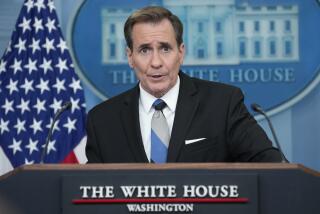Leaders Approve Ways to Verify Arms Cutbacks
- Share via
MADRID — The United States and the Soviet Union agreed Tuesday on measures that will allow them to verify the unilateral arms cutbacks each has announced recently and to lay the foundation for further disarmament talks.
Soviet President Mikhail S. Gorbachev said that he and President Bush are creating two working groups to keep each other informed on the progress of the new cutbacks and assess each other’s proposals for more sweeping reductions in their strategic arsenals.
Gorbachev described the groups as “the mechanism that will give us the opportunity to continue discussing these issues, to keep each other informed and to clarify issues for each other as they arise.”
U.S. officials cautioned against over-dramatizing their importance.
But the agreement, reached quickly during 2 1/2 hours of talks here between the two presidents, effectively puts the United States and the Soviet Union into preliminary negotiations on a new round of superpower arms cuts.
Bush told a joint press conference that he will send Reginald Bartholomew, the undersecretary of state for security affairs and a key U.S. arms negotiator, to Moscow shortly to “discuss what additional steps we can agree on” beyond the treaty signed three months ago reducing the two countries’ strategic arsenals by one-third.
This will give the United States a way of tracking the Soviet cutbacks and the Soviet Union a chance to draw the United States into new negotiations aimed at substantially greater reductions in their strategic arsenals.
The immediate focus of the talks will be detailed discussions of progress in carrying out the cutbacks announced by Bush and followed by Gorbachev that will withdraw all tactical nuclear weapons, except for a small number of U.S. bombs based in Europe.
The two presidents also took their strategic bombers off nuclear alert and accelerated the withdrawal from active status of the intercontinental ballistic missiles that are being eliminated under the new arms reduction treaty.
Verification has long been a major, and often the most complex, element in U.S.-Soviet arms accords. The unilateral character of the latest cutbacks left Washington and Moscow uncertain about how they could be sure of the timetable and extent of these reductions.
The second focus of talks, the two presidents said, will be a comparison of the two proposals each side has made for deeper cuts in strategic arms and related issues, including the development and limited deployment proposed by Bush of antimissile defense systems.
Bush said he believes that the Soviet and U.S. proposals are “very close” in substance. “What we’ve got to do is iron out more detail, have more discussions,” he added.
Bush has called, however, for the elimination of land-based intercontinental missiles with multiple warheads, the core of the Soviet arsenal. Gorbachev has suggested large, across-the-board cuts that would force the Pentagon to make hard choices between its planned B-2 bomber force and upgrading the sea-launched ballistic missiles on its Trident submarines.
The two working groups will give Moscow and Washington a forum to discuss a series of other issues, including Soviet proposals for a moratorium on nuclear testing, an end to production of weapons-grade plutonium and a pledge not to be the first to use nuclear weapons.
The two presidents also discussed the safety of the Moscow’s 27,000 nuclear weapons, an increasing concern as the Soviet Union continues to fragment. Marlin Fitzwater, Bush’s press secretary, said that Gorbachev again assured the United States that the Soviet military is “under control and nuclear weapons are safe . . . and under control of the center.”
Gorbachev also confirmed the Soviet Union’s commitment to both the new Strategic Arms Reduction Treaty with the United States and the multilateral agreement cutting conventional armaments in Europe despite his country’s virtual breakup since the accords were signed.
“There is no reason to worry or have any concern from either one or the other side,” Gorbachev told the press conference. “There is nothing to worry about. But that is very important to say, and it is also a sign of responsibility and determination.”
More to Read
Sign up for Essential California
The most important California stories and recommendations in your inbox every morning.
You may occasionally receive promotional content from the Los Angeles Times.













